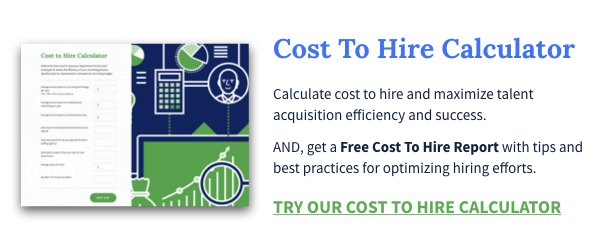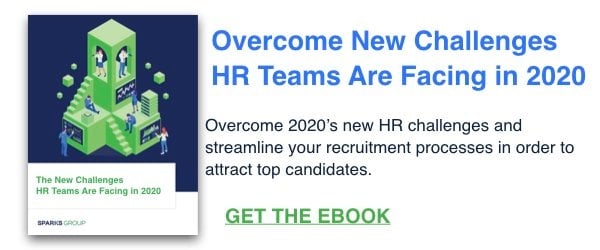
To successfully find, evaluate, and hire top talent, a recruiter must be able to understand job requirements, source candidates, assess skills and aptitudes, and create an attractive job offer that will result in a hire. These abilities are required of a recruiter no matter where they are located, or where the candidates are located.
However, recruiting remotely carries its own challenges. Extra effort must be put into communication with internal stakeholders such as hiring managers or HR, as remote recruiters lose the informal, casual, drop-in conversations that are important to generating real-time feedback on candidates. Recruiters must modify processes so that conversations about candidates are not delayed - as timely feedback from key stakeholders in the selection process can speed up the recruiting cycle, and help to ensure that candidates remain engaged throughout the process.
Sparks Group understands these challenges, with decades of experience matching candidate to company, and assisting with recruiting both remotely and in-person. This experience has led to a high level of expertise, which can be leveraged to help recruiters succeed, no matter where they (or their candidates) are located.
Related Reading: 5 Signs It’s Time To Consult With A Recruiting Firm
With some strategy and planning, a remote recruiter can be successful at accessing and hiring top talent, no matter where different parties are physically located.
To be a successful remote recruiter, here are a few things to consider:
1. Define Goals
Having clearly defined goals, both short-term and long-term, is critical for recruiting success. These goals should be transparent, so that the entire team has access to them, and they should be S.M.A.R.T.
- S: specific
- M: measurable
- A: achievable
- R: reasonable
- T: time-based
A common recruitment goal is to reduce cost-to-hire. To make this a S.M.A.R.T. goal, however, it could be expressed as: reduce cost-to-hire (Specific) by 5% (Measurable, Achievable, Reasonable) in the next quarter (Time-based).
Once the goals are set and agreed to by the team (and if you are a team of one, with your manager), they should be tracked and followed up regularly – weekly for short-term goals, monthly for long-term goals. This gives recruiters the opportunity to identify and correct any potential issues, while reinforcing the progress that is being made toward those goals.
In our experience, tracking recruiting metrics can be extremely useful. Benchmarking and monitoring key performance indicators (KPIs) help a remote recruiter to track their activity in a measurable way that is easy to communicate to others. In certain situations, a manager new to remote work may wonder if a remote employee is actually working full time; with the right metrics, even a remote worker can demonstrate measurable value to the organization.
Learn more: Top Recruiting Metrics to Track in 2020 to Improve Hiring
2. Optimize Processes
When people are in disparate physical locations, regular processes can break down. This means that all the different moving parts of the recruiting process - job requests and approvals, applicant tracking, candidate sourcing, interviews, evaluations and offers – must all be structured to ensure that they work for remote recruiters. This means providing remote access to ATS and CRM databases and reports, as well as any scheduling tools, video interviewing software, pre-employment assessment tools, etc.
Once the recruiter has the tools in place, processes should be reviewed to ensure that they are streamlined (to ensure efficiency) and optimized (to ensure best results.) While creating processes that support best results, this is also a good time to plan for the worst: creating alternative plans in case technology fails you, or a candidate; as well as a comprehensive disaster recovery plan.
Related Reading: How to Build a Remote-Enabled Tech Stack
3. Focus on Candidate Experience
Most candidates have experienced a face-to-face interview, but not everyone has been involved in a remote recruiting process. Some may be uncomfortable with unfamiliar technology, for example, video interviews; others may find it difficult to understand company culture or build rapport without an on-site interaction.
The candidate experience will benefit from streamlined processes and regular communications from the recruiter. Remain as transparent about the process as possible to build trust, and be certain that you follow through on any obligations – if you promise to follow up at a certain time, don’t let it fall through the cracks.
4. Improve Virtual Screening
Video Interviews
Video interviews are the key tool in a remote recruiter’s toolkit, offering the closest thing to an on-site interview available to remote applicants. With a video interview, both parties benefit from an interactive experience, with the opportunity for spontaneous give-and-take conversations, and organic Q&A that employers and candidates are accustomed to. To optimize video interviews, consider:
- Scheduling: Find a convenient time for all parties with a shared calendar. Consider adding in a ‘cushion’ of time before or after the interview in case of any technical difficulties.
- Agenda: Set an agenda and stick to it, to keep the conversation moving. In a collaborative interview, assign each participant their own subject or specific questions to be asked during the interview.
- Pre-employment tech check: Schedule a run-through before the interview to ensure that the candidate and employer representatives all have the necessary software and tools and know how to use them.
- Follow up: Follow up with the hiring team and the candidate after the interview, so that expectations are clear and responsibilities for next steps are assigned.
Asynchronous Video Interviews
One-sided video interviews, where a candidate is recorded answering questions, are growing in popularity. They offer benefits to the candidate, as they can be completed at their convenience. They are also beneficial to recruiters, as they can be reviewed multiple times, by people in different departments and positions, who may be looking for different skills and attributes in a candidate.
5. Create a Workspace that Works
One of the primary considerations of a remote recruiter is creating a workspace that promotes organization and productivity. While a separate room may not be available to be used as an office, many remote recruiters have successfully transformed a corner of a different room, or even the space under a staircase into a beautiful, functional, space-saving office.
6. Mindset
Finally, the most important tactic in a remote recruiting toolkit is having the right mindset. Be flexible, and empathetic about any difficulties that may arise. Put extra effort into communication with candidates and with coworkers, with the understanding that this effort will have a significant positive impact on the recruiting process.
Related Reading: How to Be a Successful Remote Recruiter
And finally, as much as possible, stick to a routine and a schedule. When work and home are located in the same place, it is easy for lines to become blurred. To avoid burnout, be certain that you step away from the office once in a while – unplug and try to avoid having work creep into your personal time.
Recruiting is a challenge. Finding qualified candidates, engaging them through the process, evaluating and hiring them successfully involves a wide range of skills and abilities. And recruiting becomes even more complicated when processes are disrupted, for example, when recruiters are in a location separate from the company and the candidate. However, with some additional planning and strategizing, recruiters can be just as successful remote as on-site.
If your company is looking to optimize recruiting and engage top talent, contact Sparks Group. Sparks Group is a nationally-awarded, certified diverse staffing agency with proven experience in finding the right candidate for every open position. As a staffing partner, Sparks Group can also help companies streamline and improve recruitment processes to ensure the best possible outcomes. Contact Sparks Group today to connect with top talent and improve your recruitment efforts today.







